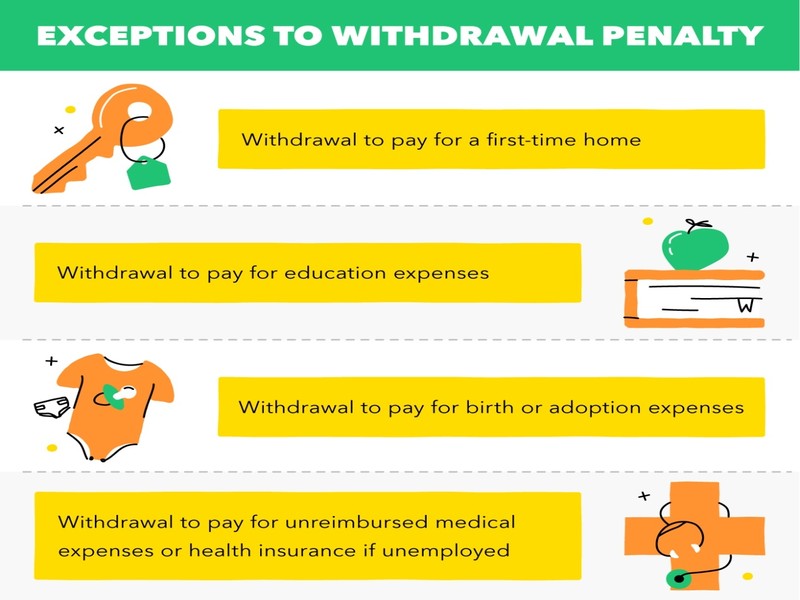Roth IRA Early Withdrawals: When to Withdraw + Potential Penalties

Understanding Roth IRA Early Withdrawals and the Implications of Penalties
In today’s financial landscape, retirement savings are more important than ever. According to a recent survey by the Employee Benefit Research Institute (EBRI), over 60% of working Americans have less than $1,000 saved for retirement. This statistic underscores the critical need for individuals to plan effectively and understand their options when it comes to accessing funds early from a Roth IRA.
The Basics: What is a Roth IRA?
A Roth Individual Retirement Account (IRA) is a type of individual retirement savings account that allows you to contribute after-tax dollars. Unlike Traditional IRAs, contributions made to a Roth IRA are not tax-deductible in the year they are made. However, qualified withdrawals from a Roth IRA are generally tax-free and penalty-free.
Roth IRA vs. Traditional IRA
While both types of IRAs allow individuals to save for retirement, there are significant differences:
| Roth IRA | Traditional IRA | |
|---|---|---|
| Contributions | Made with after-tax dollars | May be tax-deductible |
| Earnings Growth | Grows tax-free | Grows tax-deferred |
| Tax Treatment on Withdrawals | No taxes or penalties on qualified withdrawals | Income tax and potential penalties apply to distributions |
| Contribution Limits | Based on filing status and income thresholds | Not based on income thresholds (up to $6,000 annually) |
When Can I Withdraw from My Roth IRA?
The rules for withdrawing funds from a Roth IRA are designed to encourage long-term savings. Here’s what you need to know:
- Age Requirement: You must be 59½ or older.
- Five-Year Rule: The account must have been open for at least five years.
If you do not meet these requirements, there are exceptions to the early withdrawal penalty that can apply in specific situations. These include:
- Purchasing a first-time home (up to $10,000)
- Qualified education expenses
- Birth or adoption expenses
- Unreimbursed medical expenses exceeding 7.5% of your adjusted gross income
- Health insurance premiums if you are unemployed
Roth IRA Withdrawal Penalties and Rules to Consider
If you do not qualify for an exception or meet the age and five-year requirements, early withdrawals from a Roth IRA can result in penalties:
- Taxation of Earnings: Any earnings withdrawn before meeting the qualifications are subject to income tax.
- Penalty on Early Withdrawals: A 10% additional tax may apply if you withdraw funds early and do not qualify for an exception.
It’s important to note that while contributions can be withdrawn at any time without penalty, once earnings are touched, the penalties kick in. This means it's crucial to plan ahead before making withdrawals.
The Pros and Cons of Early Withdrawals from a Roth IRA
Early withdrawal decisions should not be made lightly. Here’s what you need to consider:
Pros:
- Tax-free and penalty-free withdrawals if qualifications are met.
- Potential for avoiding tax penalties in certain situations (e.g., first-time home purchase).
Cons:
- Earnings withdrawn early can be subject to both income taxes and a 10% penalty.
- You cannot repay the money once it is withdrawn, potentially reducing your retirement savings.
- Missed years of growth on your investment.
Strategic Planning for Roth IRA Withdrawals
To avoid penalties and maximize your savings:
- Plan Ahead: Understand the age and five-year rules before making any withdrawals.
- Evaluate Exceptions: If you need funds early, assess whether any exceptions apply to your situation.
- Seek Professional Advice: Consult with a financial advisor or tax professional if you are unsure about the implications of an early withdrawal.
Conclusion
Roth IRAs offer unique benefits for retirement savings, particularly in terms of tax-free withdrawals. However, it’s crucial to understand the rules and potential penalties associated with early withdrawals. By planning ahead and carefully considering your options, you can avoid unnecessary financial burdens and ensure that your Roth IRA continues to grow as intended.
Takeaways
- Roth IRAs allow tax-free and penalty-free qualified withdrawals after age 59½ and five years of account ownership.
- Early withdrawals can be subject to taxes and penalties unless specific exceptions apply (e.g., first-time home purchase).
- Contributions can be withdrawn at any time without penalty, but earnings are subject to taxation and a potential 10% penalty if withdrawn early.

